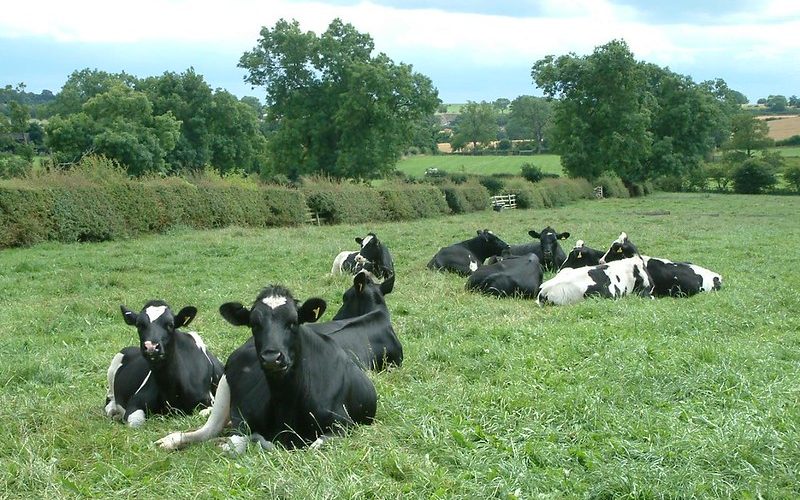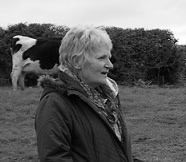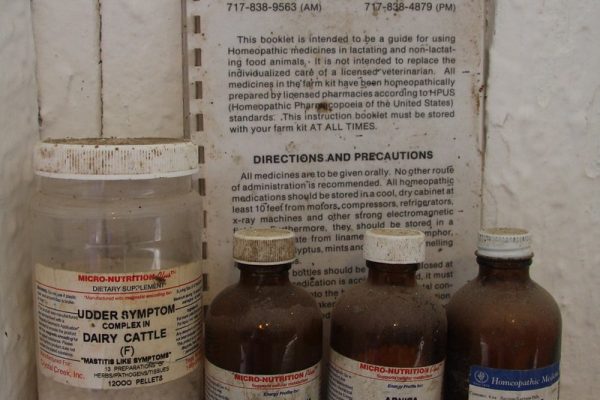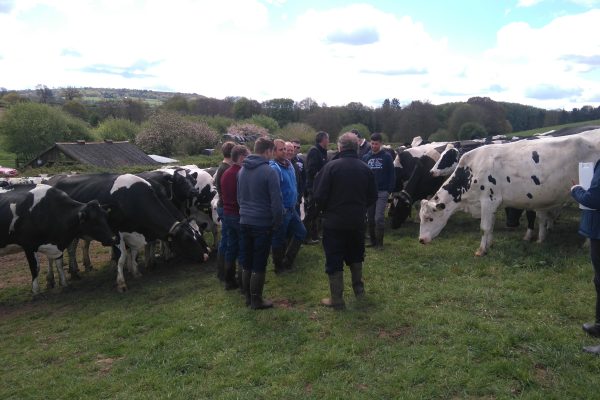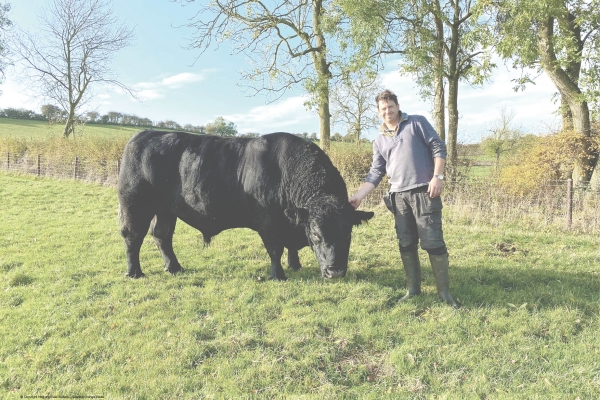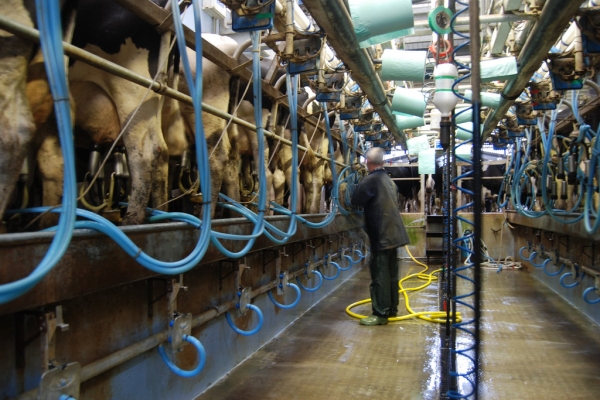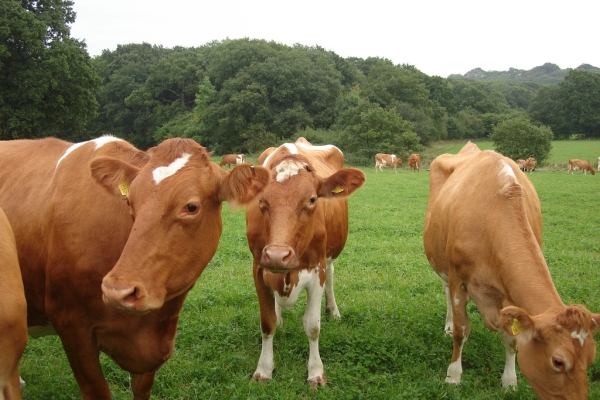Homeopathy; a credible alternative to antibiotics
… and not just a load of old bull!
What if somebody told you that there is a credible alternative to antibiotics, that it is capable of saving you money and has the possibility to transform the health of your herd or flock? Wouldn’t you prick up your ears? Or maybe you’d just laugh . . .
Well I once would have done the same. I had been a conventional dairy farmer all of my life when my ‘journey’ into the alternative began, more than ten years ago. Our farm was vaccinating for leptospirosis and Bovine Viral Diarrhoea (BVD), and our vets wanted us to vaccinate for Infectious Bovine Rhinotracheitis (IBR) as well. Every time they came out they prescribed a dose of antibiotics – most of the time because they couldn’t work out what exactly was wrong. It wasn’t just the cost and time that bothered me, I had recently had a kidney infection and then had a bad reaction to antibiotics which had left me unable to work for months. This made me seriously question the effect drugs were having on my herd’s long-term health and on my land.
This was back in 2004 and, as usual that year, my family and I all went off to the Welsh Dairy Event where we saw Crossgates Farm’s homeopathy for farmers stand, which intrigued me. The boys circled like vultures but I went and spoke to them and they convinced me to try homeopathy and also told me about the Homeopathy at Wellie Level (HAWL) course, which I eventually registered for in 2008 after some initial success using Crossgates’ remedies.
Putting HAWL teachings into practice
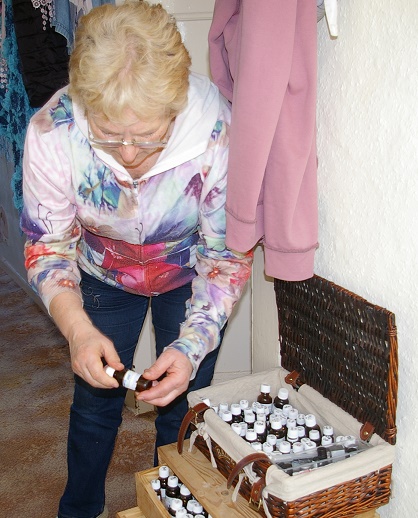
After completing the HAWL course I came back to the farm and started practicing what I had learnt on my herd (see Sally with her remedy collection, pictured right). The course teaches farmers to observe their animals in a whole new way and gives them tools to act quickly at points of stress, often preventing problems from developing. This was new to me and made such sense – as farmers we all know the triggers that can precipitate illness and/or loss of production or condition: separation, transportation, dehorning, castration, AI, poor ventilation, even bad weather… As well as acute observational skills, we are taught how to make our own decisions, including how to assess whether homeopathy is appropriate or whether we should call the vet. HAWL farmers learn a ‘traffic light’ system – the aim being to keep your herd in the green and act quickly as soon as you see any warning signs – i.e. amber. Taking early action in the amber zone means that fewer animals end up ‘in the red’ – needing the vet.
This has made such a difference to the way we work; using homeopathy enables us to be proactive. It empowers us as we are able to act before those ‘not quite right’ animals become properly ill.
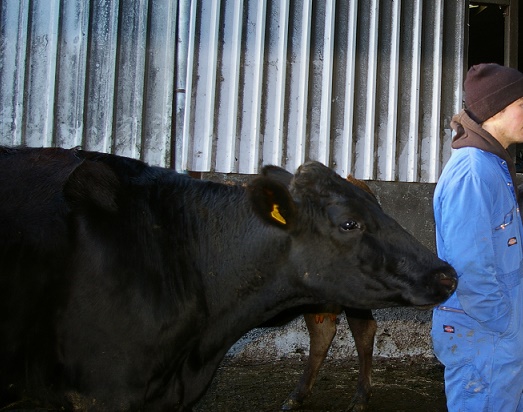
One of Sally’s jersey crossbreeds with Daf, her herdsman
We’re now nipping things in the bud as soon as a cow or calf is off-colour and before she gets ill – it’s so much easier for her to come back to health from this point. By the time you call the vet, you’re in a serious situation. We’re able to treat any observable symptoms before they develop into a disease that the vet can recognise. And we now think ahead to prevent problems. For instance, yesterday, we knew the weather was going to turn very cold so we were able to treat the troughs with a remedy called Aconite so the susceptible cows didn’t develop a chill or a cough. Little actions like this have meant that our cows now get very little pneumonia. This makes the difference between good herd health and a vet visit that often results in antibiotics being prescribed.
The cost benefits
Over the years, homeopathy has brought us on financially – we now sell stock rather than cull. I think the mainstream assumption is always that if you use homeopathy / reduce antibiotics your cull rate will go up, but ours hasn’t and our stock is now in demand. In fact, our fertility rate is also up, and cell counts are down. When people ask me whether homeopathy works I tell them that since 2008, when I took the HAWL course, our vet and med bill has halved per livestock unit, i.e. we have halved our pence spent per litre of milk produced and, as we produce close to one million litres per year, that’s a massive saving to our farm.
Once I started to talk about our farm’s success with homeopathy, others began to take notice and I eventually persuaded HAWL to run a course here in Carmarthenshire. Since then interest in this area has snowballed and this year, 2017, HAWL is about to run the third course in St Clears which will mean nearly 50 farmers in this part of Wales will be trained to use homeopathy. Many of these farmers are organic or part of the NOP (US National Organic Program) scheme which means they must remain totally antibiotic free. But even the conventional farmer, (as we are until we achieve our organic status), can benefit from the use of homeopathy, since, with no antibiotic treatment, there is no need to withhold milk from the tank. Another bonus is the cost comparison with veterinary medicines – one nasal spray of a remedy costs around £12 for up to 100 doses.
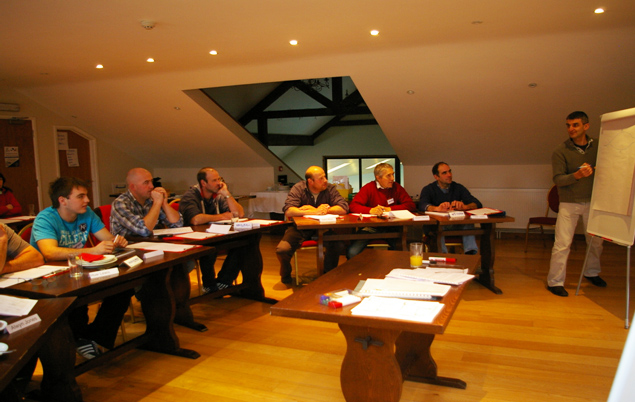
HAWL course, Wales
A constant learning process
Homeopathy is not a magic bullet, the system needs proper learning and responsible application. It’s a bit like ‘going organic’ – as I have recently found out! It’s not simply stopping doing something, different skills are needed which means a steep learning curve. I host regular meetings and workshops with homeopathic vets and teachers here on my farm, so we all continue to learn and support one another. Five farms from the area have recently started to take part in a pilot research study with HAWL vet Dr. Chris Aukland to investigate whether a homeopathic approach creates a healthier farm. This is generously supported by HRH the Prince of Wales who is keenly interested in sustainable initiatives to reduce antimicrobial (antibiotic) resistance in the food chain and on the environment.
Homeopathy has not only transformed the health of our farm but it has also transformed my life. When I first started out with homeopathy, farming friends and colleagues would ask me what I was using and whether it worked – and I would tell them to ask me in 10 years’ time and we would see. Well 10 years later the farm is more profitable, we’re about to become organic, and I’m three quarters of the way to becoming a licensed homeopath, so there’s the answer!
Some useful resources:
There are hundreds of homeopathic remedies but some key ones that we use all the time are:
Arnica – for any physical injury, eg lameness from bruising, mastitis from a kick in the udder, falls, prolonged calvings where cow/calf are exhausted.
Aconite – for any ‘stressful’ situation where animals are likely to be fearful, anxious or experience shock – all vet visits including TB testing, the crush, all situations that are new to the animal, transportation, separation, etc. Also, as mentioned, any cough, chill, high temperature that comes on from bitter cold weather or wind.
Belladonna – early stages of mastitis when the udder is hot and hard and the cow reacts – possibly violently – when udder is touched.
Hypericum – injuries to spinal nerves from falls or birth (downer cow).
Ignatia – stress of separation – weaning, loss of calf, loss of companion.
Here are some suggestions of where remedies can be bought from and where advice can be sought from:
Ainsworths Pharmacy – farm advice from Tony Pinkus on 07774 240630, tony@ainsworths.com
Crossgates Bioenergetics – advice from Vicki on 01756 749444, cattle@crossgates.com
Helios Pharmacy – advice from Roz Crompton on 01892 537254, roz.crompton@helios.co.uk
Homeopathy at Wellie Level (HAWL)
HAWL runs its Farm Homeopathy course at HRH, The Prince of Wales’ farm in Tetbury every spring and autumn and to date has taught around 500 farmers from all over Britain; both conventional and organic. Farms represented have included sheep, beef, pigs, poultry and even alpacas, but the bigger percentage have been dairy. Most farmers have cited their reasons for attending the course as being increasingly worried about antibiotic issues, many already finding that antibiotics are not always working and feeling that there must be a better way. Dates on the next Farm Homeopathy course can be found on the HAWL website.
Sally farms a dairy herd of 280 crossbreeds in Carmarthenshire, SW Wales, with her partner Gary, and they are currently converting the farm to organic. Since 2013, she has been a volunteer area co-ordinator for HAWL. She is also training to become a licensed homeopath at the Welsh School of Homeopathy.
Header image photo credit: Janie Caldbeck. All other photos: HAWL
